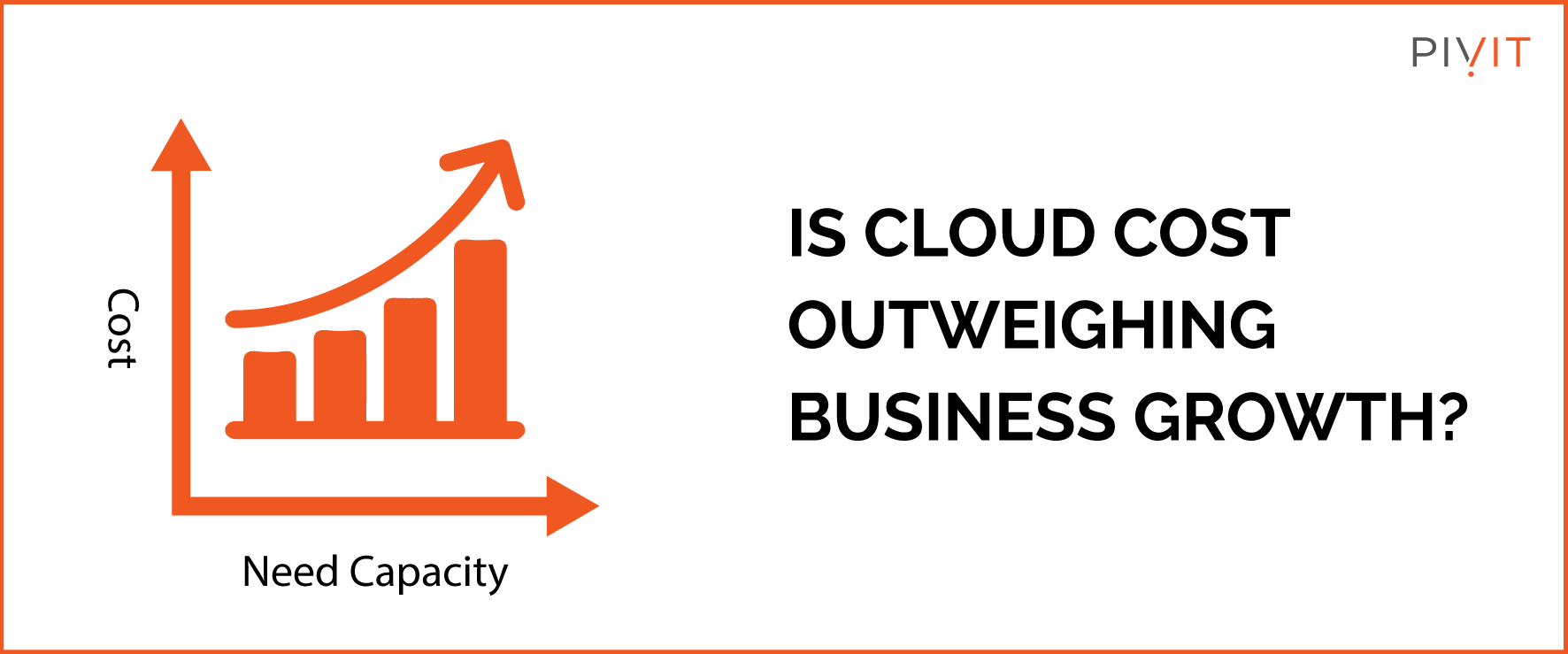Is Your Cloud Solution Preventing Business Growth?
-1.png)
In many ways, a cloud solution is a lot like renting a nice apartment. If something breaks, no problem; it’s handled. You don’t have to worry about weekly or monthly maintenance and business growth continues. That comes with the package.
And security and surveillance? An afterthought, at most. Your provider, like a landlord, has everything installed and ready to defend your domain. But could your cloud solution be preventing business growth?
Year after year, as your monthly fees get sucked from your account to your provider’s, you may start to wonder if renting long-term is worth it. And if your business grows, upgrading to a “bigger place” may drive costs up even more. After a while, you may wonder whether it’s better to own than rent.
While cloud computing offers organizations affordability, ease of use, and a degree of flexibility, it’s not without its downsides, particularly when it comes to cost, flexibility, and agility. Often, when businesses start to outgrow their cloud solution, they consider moving from the cloud to colocation—or even back to an in-house solution. Why? Well, when the apartment isn’t enough—or costs too much—it’s sometimes better to get your own place.
Here are 4 key downsides to a cloud-based solution.
1. The Cost of Outsourcing Your Cloud
For a small company or one that’s in the midst of scaling, a cloud solution allows them to get up and running with little up-front cost and minimal effort. However, the monthly expense often adds up quickly.
It’s been estimated that, on average, a fully cloud-hosted solution can range between $100 and $200 per desktop per month. As you add more employees—and more machines—the monthly fee may climb far higher than what you originally budgeted for.

As the prices climb, many companies find the juice isn’t worth the squeeze and opt for colocation. With colocation, your upfront cost is higher, but your monthly expense is minimal and, more importantly, predictable.
For some organizations, public cloud services can be an effective cost workaround, at least in the short term. However, when resources are shared, there’s always the chance you end up getting the short end of the bandwidth stick.
One way to avoid the cost of private cloud without limiting your growth potential is with PivIT’s infrastructure solutions. With PivIT’s extensive list of OEMs, you have everything you need to craft a scalable colocation or in-house solution without breaking the bank.
By sourcing your own perfect mix of new and legacy equipment with PivIT, you can save money up-front and expand easier without sacrificing quality.
2. Limited Control Over Resources
In most situations, at least in the beginning, the resources you get from your cloud provider are adequate. The SLA may even give you enough headroom for a little growth—both horizontally and vertically. However, when it comes time to either expand your organization’s infrastructure or add a new product or service, your cloud space may start to feel a little cramped.
One way to avoid—or at least delay—an expensive cloud upgrade is to over-provision from the get-go. While this may significantly increase your monthly expenses, you may be able to go years without needing to upgrade or switch providers.
When you have your own setup, whether on-premise or collocated, you call the shots. Circling back to the home analogy, if you want to paint a wall, upgrade an appliance, or add a new wing, it’s all good; no worries. With cloud computing, upgrading your resources can be like asking your landlord for a bigger porch; it could be expensive—or even impossible.
With PivIT, however, you can obtain—and maintain—your own equipment. With OneCall, you can get an SLA custom designed to your present situation and future goals. When it’s time to add more resources, you have full control, and PivIT’s team can show you how to do it for less.

3. Switching Vendors Can Be Difficult
Transitioning from one cloud vendor to another may come with several obstacles:
- Platform incompatibility. The new vendor may have a different platform that creates conflicts.
- Security sacrifices. You may have to settle for an insufficient security solution with your new vendor.
- Expensive transitioning. Downtime during the transition can add to the upfront costs. Learn more about the full cost of downtime.
Ideally, your first cloud provider will be a long-term solution. However, change happens, both within your organization and with your cloud provider.
A switch, whether by design or because you grew dissatisfied with your cloud services, can be cumbersome. In some cases, even making a lateral move from one provider to another, may incur extra costs, particularly if you have to add additional services your new provider’s SLA doesn’t include.
Unfortunately, there’s no easy way around the switching vendors issue; once you’re locked in, it can be tough to pull out. But PivIT can help you transition away from a dependence on cloud providers.
PivIT can guide you through the process of procuring the infrastructural components for your specific business model. Take action today to finish the procurement process with PivIT.
4. Security Vulnerabilities
In the cloud computing conversation, security is often the elephant in the room no one is talking about, especially when it comes to trusting the provider’s employees with access to your resources and workloads.
If an employee were to be compromised by a hacker or hacker association, they could abuse their privileges and leak, alter, or delete your data. On the other hand, with an in-house computing environment, your IT team can govern access privileges.
Also, while cloud providers typically have some of the best security available, with a full-cloud solution, you still have to rely on the internet to access all your services.
Companies that opt for a hybrid solution or colocation, on the other hand, can exercise direct control over which resources are accessed via the internet. In addition, they can choose their method of connection, such as through a VPN, WAN, or SD-WAN, custom-designing their security solutions in the process.
With a cloud solution, because your workloads are in the cloud, they are also exposed to all the cybercriminals and malware creeping through the internet. A cloud provider is like a large apartment building; a thief knows that if they can get through the door, they can gain access to not just one household but many.
When you have your own network, whether internally or in a collocated setup, the threats, while considerable, are more limited. If you want, you have the option of setting up a true least-privilege architecture.
You don’t have to worry whether your cloud provider has vulnerable systems or people that put your security at risk. PivIT can provide help sourcing the equipment and configuring your setup to enhance the safety of your network.
Bonus Solution: How PivIT Helps
PivIT provides clients with the hardware they need and OneCall to maintain your new or existing infrastructure. With PivIT, you can set up an effective in-house or collocated environment and use OneCall to protect your investment.
With OneCall, you can select the level of service you need according to the demands of your infrastructure. In the event of a failure, your system can be up and running again as quickly as it would if you had hosted it in the cloud—or quicker. PivIT’s extensive list of OEMs gives you the freedom to choose the equipment you need for your network—and for less. You can also upgrade as needed and opt for legacy equipment—backed by OneCall—to reduce your initial investment.
Further, with EXTEND, you can use PivIT’s seasoned professionals to help with everything from ascertaining what will work best for your network to installation to troubleshooting. And there’s no need to worry about logistics because PivIT takes care of that, as well.
Perhaps you’re on the fence between the convenience of the cloud and the flexibility, long-term savings, and security of an in-house solution. You don’t have to rent an apartment if that’s not your style. You can use PivIT for a comprehensive solution with the reliable support of OneCall and EXTEND.

